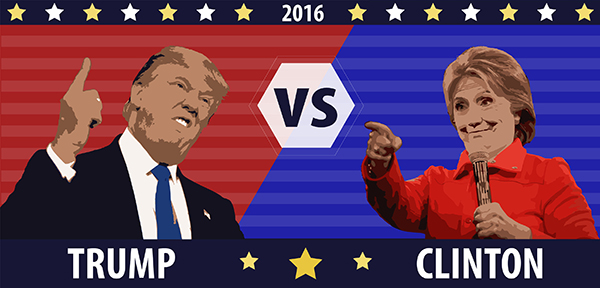Keeping an eye on the US presidential election
The race to the White House will come to an end after US Election Day on 8 November, when Americans vote in their new president for a four-year term. The US presidential election is a highly scrutinised event internationally. When campaigning is in full swing leading up to Election Day, presidential candidates from the Democratic and Republican parties become the focus of attention.
With Democratic nominee Hillary Clinton and Republican candidate Donald Trump vying to become the next president of the United States, this election stands to be one of the most divisive and polarizing in US history. Observers and investors are concerned with the relationship between politics, the economy and financial markets following the election outcome.

What to note about the elections?
Given the uncertainty around the outcome of the forthcoming presidential election, it is not surprising that investors are nervous about the economy and financial markets. Regardless of who becomes the next president, investors who believe that their financial wellbeing could be impacted may come under the influence of emotions.
To avoid being affected by investment sentiment, it is important to be aware of the key differences between the Democratic and Republican platforms to understand how the presidential election will affect the economy, financial markets and personal investments.
- Economic plans: The US economy is struggling with slow growth. Both the Democrats and Republicans have laid out their vision for the US economy, but their platforms are diametrically different. In terms of taxes, Clinton has called for an additional 4% income tax on the wealthy who earn more than US$5 million to address the issue of income inequality. On the other hand, Trump plans to cut taxes to stimulate the economy and proposes to reduce the number of tax brackets. In terms of job creation, both Clinton and Trump have promised to create jobs and put Americans back to work. With regards to economic solutions, Democrats support investing in employment training, infrastructure spending and new energy. Republicans support reduction of corporate taxation, infrastructure investment, reducing the trade deficit and lowering taxes in order to create jobs, particularly in the manufacturing sector.
- Trade agreements: Whoever wins the presidency may change the prevailing US trade agreements. Trump advocates "fairer" trade deals that will protect the commercial concerns of the US. He is against the Trans-Pacific Partnership and intends to re-open negotiations on already signed pacts such as the North America Free Trade Agreement. He promotes the imposition of high tariffs on Mexican and Chinese goods. Whilst Clinton also opposes the Trans-Pacific Partnership, she acknowledges that high tariffs could lead to a trade war.
- Interest rate outlook: The uncertainty of whether the US Federal Reserve will raise interest rates has set global markets on edge for most of the past year. The Fed has chosen to keep interest rate unchanged since it raised the federal funds rate by 0.25% in December last year. The market is watching closely as to whether the Fed will change their stance on interest rate after the presidential election, and how the effect of its rate increase will play out on the US economy, foreign trade and global investment markets.
US interest rate hikes, and the pace and magnitude of the hikes, may bring adverse effects to market liquidity and investment sentiment, which will impact stocks, bonds and properties. Given that the Hong Kong dollar is pegged to the US dollar, a US rate hike could potentially lead to Hong Kong banks raising interest rates as well.
- The congressional election: Both the presidential election and congressional election (which include the Senate election and House of Representatives election) will take place on 8 November. Under the US political regime, the Congress has the power of legislature, and takes the role of check and balance of the president's power. Republicans now control both the Senate and House of Representatives while the current president, Barack Obama, is a Democrat. This causes the relationship between the White House and Congress to be tense at times. Whether the White House and Congress will be controlled by the same party or different parties may affect US policy making in the future.
Long-term investment
While conventional wisdom might suggest that the outcome of the US presidential election does not have such a major impact on one's investment portfolio, there will nevertheless be some investor speculation and nervousness that will trigger market volatility.
Rather than be guided by the emotions around the elections, when investing in the US markets, there are still fundamental factors that will affect long-term investments such as economic growth, interest rates and inflation to keep in mind.
Successful investing takes into consideration the various factors that might affect the economy and a plan that accounts for goals, time horizons and risk comfort levels. Regardless of who wins, investing with a long-term balanced and consistent approach is key to riding the wave of uncertainty.



